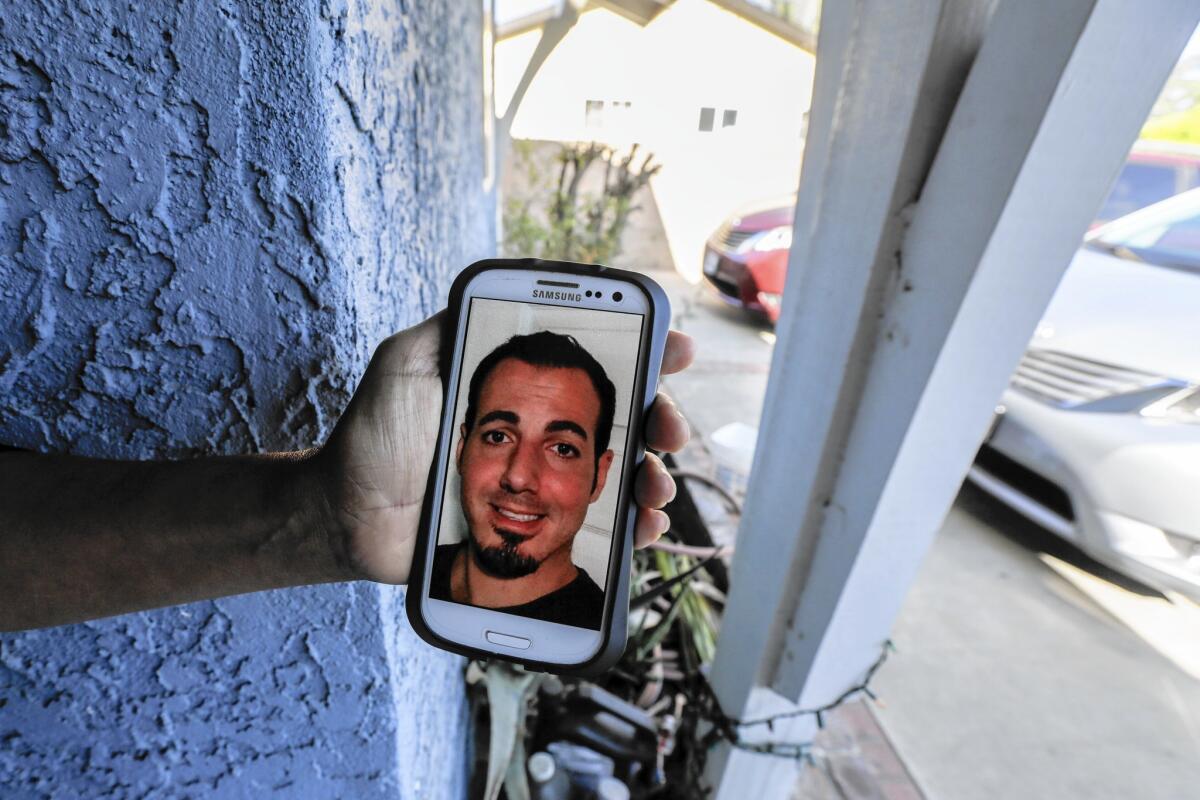Homophobia, drugs and mental illness may have led to gay man’s killing and father’s arrest

Next-door neighbor Maria Gomez holds her phone displaying a photo of Amier Issa, who was allegedly killed by his father at the family’s North Hills home last week.
The house in North Hills is on a street with beautiful rosebushes and bad sidewalks, one in a row of single-story homes with iron security gates. Like his neighbors, Shehada “Joe” Issa had ringed his modest property with a strong fence and slapped a sign in the window to warn off trespassers.
But in this high-crime neighborhood, where few speak English and most take pains to guard what little they have, the violence that destroyed the Issa family didn’t come from outside.
New details emerged Saturday about a strange series of events last week that left Shehada Issa in jail and his wife and son dead. Information from law enforcement agencies and interviews with neighbors suggested that a long-brewing mix of drugs, mental illness, homophobia and extreme family dysfunction had finally led to a tragic result.
The Los Angeles County district attorney’s office announced Friday that Issa, 69, was being charged with first-degree murder in the shooting of his 29-year-old son, Amir Issa, who was found dead Tuesday morning outside the family’s home on Rayen Street. His arraignment is scheduled for April 11. Found inside the house was Shehada’s wife and Amir’s mother, Rabihah Issa, 68. She had been stabbed, police said, and may have been dead for some time before her body was discovered.
Shehada Issa has not been charged in his wife’s death. Police said he admitted to shooting his son with a shotgun. Amir Issa, who had gunshot wounds to the face and abdomen, was pronounced dead at the scene.
The district attorney’s office alleged in a statement that Issa killed his son because of his “sexual orientation,” a move that brought national publicity to the case over the weekend. Issa could face stiffer penalties at trial if the shooting is prosecuted as a hate crime.
There were a number of signs that Amir Issa’s killing was not a simple story of a father acting out of murderous rage that his son was gay.
Turmoil appears to have reigned behind closed doors at the Issa home since Amir moved back in with his parents, which neighbors said occurred within the last two years. LAPD Sgt. Greg Bruce said officers had been called to the home to help evict Amir, whose parents were attempting to sell the house against their son’s wishes. The son had even vandalized the house, according to police.
A spokeswoman for the district attorney’s office declined Saturday to comment on the case.
Joel Munoz, 38, has lived across the street from the Issas for 15 years. Speaking through the bars of his driveway gate Saturday, Munoz said he had recently done handiwork for Shehada Issa, who complained to him about what he described as his son’s problems with drugs and mental illness.
“He was a good guy. The son was a bad guy,” Munoz said. “I’m so sorry for the old man.”
Neighbor Alfredo Mendez, 67, said that Issa tended avidly to his trees — two palms and a mango — and that the two would sometimes discuss arboriculture. Mendez said he knew nothing of the Issa family’s problems.
Those problems were evident, among other places, on Amir Issa’s Facebook page. In his last post, 10 days before his death, he said he worried that his parents, brother and sister were “literally controlling me in my sleep” and that “they tell people to rape and molest me and make it seem like I enjoy that.”
“If there is a devil or evil spirit, I truly believe it manifests itself in my family,” he wrote.
Amir also posted a video to his Facebook page in which he interrogates his parents about whether they had performed certain sex acts.
“That’s not appropriate for a child to ask his parents,” Rabihah Issa says to the camera as she sits on the sofa, a large crucifix on the wall behind her.
Shehada Issa responds more angrily to his son, calling him a “pervert” and saying, “None of your relatives want to have anything to do with you.”
According to court records, a man with the name Amir Issa whose parents live in Los Angeles was convicted in San Diego of assault with a deadly weapon in 2010. He had slashed his ex-boyfriend across the face with a knife, leaving him hospitalized. Issa, who fled to Las Vegas during jury deliberations, was sentenced first to treatment at a state mental hospital and then to three years’ probation with further mental health treatment.
Police declined to comment on whether the victim in last week’s killing was the same Amir Issa convicted in the knife assault.
No one could be found Saturday at the Issas’ home, a squat yellow structure with a cracked driveway and rusted basketball hoop over the garage.
Further complicating Shehada Issa’s case is the apparent homicide of his wife. Police said the condition of Rabihah’s body indicated she may have been dead “for a while” before Amir Issa was shot. LAPD Officer Mike Lopez said she was “stabbed numerous times.” Asked whether Amir Issa might have killed his mother before being shot by his father, Lopez said, “That’s something that detectives will investigate.”
Francisco Gonzalez Jr., whose parents live next door to Shehada Issa, said he had been aware for some time that feelings ran high between Issa and his son. Gonzalez’s parents, who do not speak fluent English, could hear the father and son next door shouting at each other but didn’t understand what was being said. Gonzalez said he saw Shehada Issa several months ago standing out by his fence and asked him what was going on.
“It’s just my son acting crazy again,” Issa told him. “It’s the drugs. I called the cops, so I’m just waiting for them.”
On Tuesday, Gonzalez said, he was babysitting his niece at his parents’ house when he heard shots from next door. Running outside, he found Shehada Issa in the frontyard with a cellphone to his ear. Gonzalez thought he heard the voice of a 911 operator on the line.
“Were those bullets?” Gonzalez asked. “Are you OK, Joe?”
Gonzalez said Issa waved reassuringly, then answered:
“Everything is fine now.”
Times staff writers Matt Hamilton and Rong-Gong Lin II contributed to this report.
ALSO
What it’s like to live in a city with a $14 minimum wage
Plane slams into car parked on shoulder of freeway; car passenger killed
Police are pushing for a more coordinated crackdown on L.A.’s deadly street racing scene
More to Read
Sign up for Essential California
The most important California stories and recommendations in your inbox every morning.
You may occasionally receive promotional content from the Los Angeles Times.













